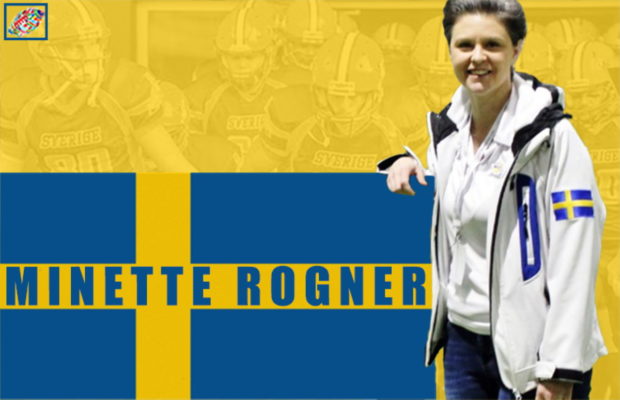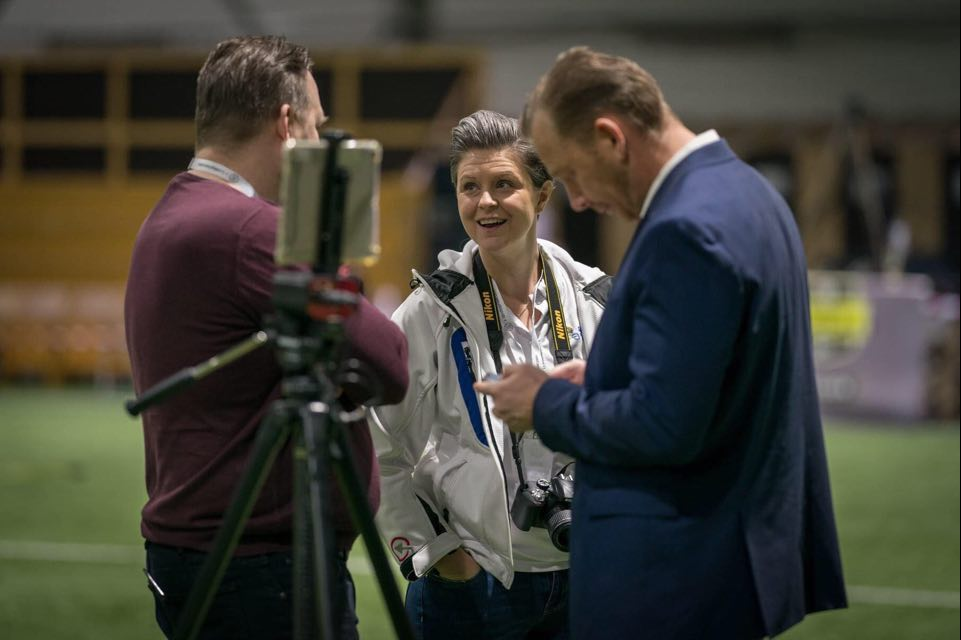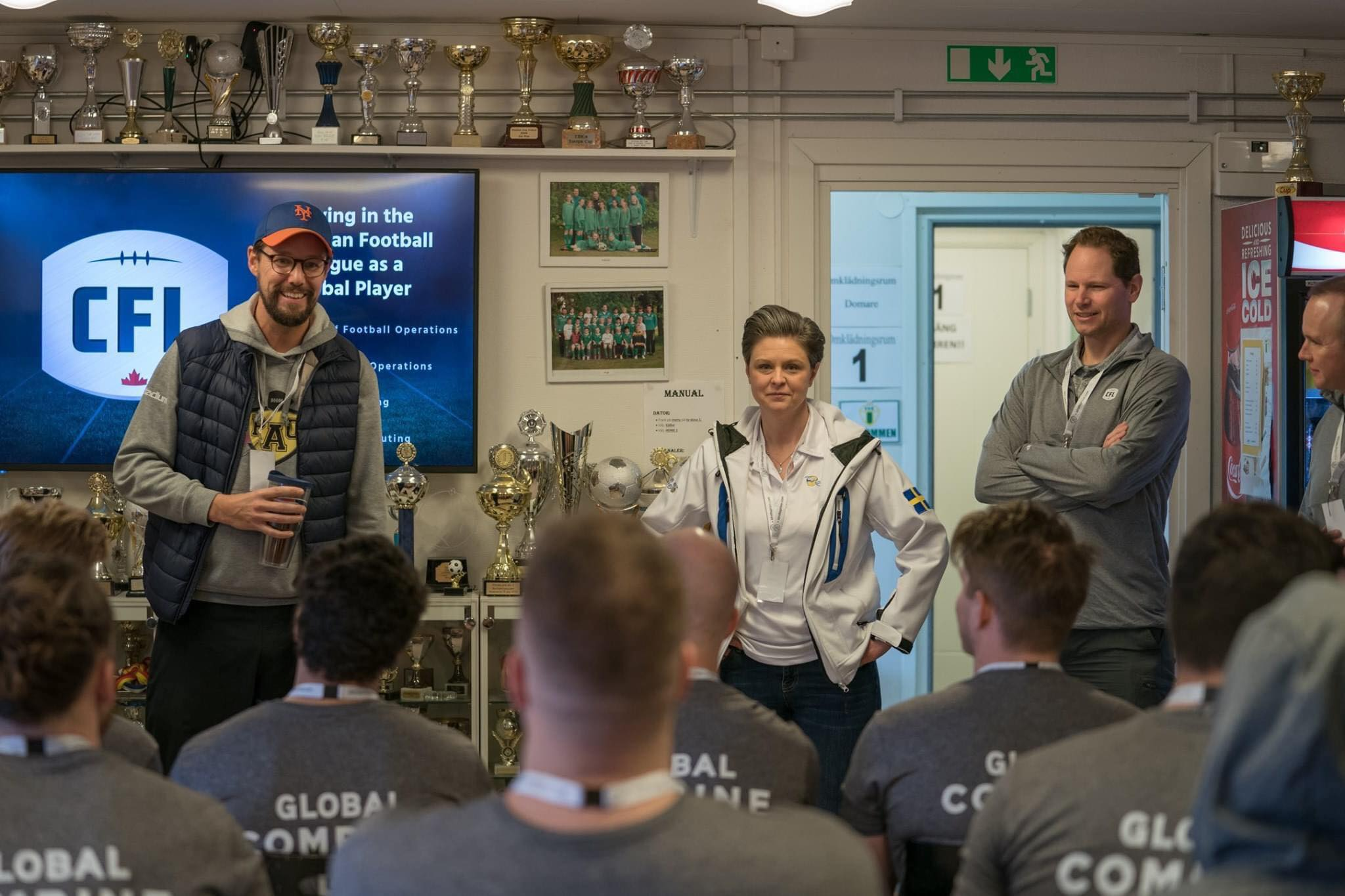Swedish American Football Federation president Minette Rogner truly passionate about the game

Passion can be a fascinating thing. It fulfills us, drives us to succeed, and can often be found in the most unique of places. This was the case with Minette Rogner. No one could have ever guessed that she would find her passion in American football, a love for the game that would see her become the first female president of the Swedish Federation and the face of the sport in her country. It wasn’t even a blip on her radar.
“I came home from working five years at sea and my brothers both played. They asked if I wanted to watch a game,” explains Rogner. “I didn’t know anything about American football back then.”
That viewing turned into two and soon she was attending senior games in Stockholm regularly, drawn by something she felt she was missing in her own life.
“I really liked the idea of being part of a group, belonging to something. I lived abroad when everyone else became involved in sport, so I never got a chance to do that,” says Rogner. “I started to see all the people around, the volunteers, the refs, the managers, helping out. I wanted to do something. I wanted to be a part of that.”
As anyone who’s been around amateur sport knows, you can never turn down a volunteer. Soon Rogner was managing a Stockholm junior team, which turned into managing a regional team and eventually the Swedish national team. Fifteen years later, she’s an entrenched member of the federation and on her second separate stint as President.

Photo: Jonas Domfors
“Time flies when you are having fun, I guess,” she laughs.
It hasn’t all been smooth sailing. Rogner’s first stint as SAFF President came in the wake of Sweden cancelling the 2015 World Championships in Stockholm, later held in the USA, and the controversy surrounding former SAFF and IFAF president Tommy Wiking, which caused a split in the international governing body. After weathering the storm, Rogner felt the need to step away from the game.
“That was a very intense time,” she admits. “I needed to give the job to someone who could give football in Sweden the push it needed. I didn’t have the energy at that time to do that.”
The desire to stay involved did not dissipate, however. She tried to fill the void by becoming active in her daughter’s handball association, but football was still her passion. A couple of years later and she’s back in the President’s chair and handling another unique crisis in the form of the COVID-19 pandemic.
The Swedish federation has acted swiftly in response to the virus and had put competition on hold since early March. They’ve been hard at work devising return to play protocol and creating a flexible schedule for the fall which can begin in either mid-August or mid-September depending on government regulations.
“The kids want to play football, so we are going to do whatever we can to make it safe for them.”
Rogner believes communication has been the key to their response to the virus. Keeping clubs informed with every tidbit of new information, however small, has kept everyone ready and on the same page. That has meant being a vocal part of the government’s sports briefings and keeping officials abreast of the unique needs of football when it comes to crafting their regulations.
“As a head of a federation, its important to always demand answers from the people in charge. You can’t be shy because you need that information to tell your clubs and make decisions,” she explains.

Minette addressing the CFL Global Combine athletes Photo: Jonas Domfors
Even as she leads her country through this unprecedented time, a lot of planning is going into the future of the sport in Sweden.
“We are looking at making a new federation in Sweden, combining with the baseball, softball, and field hockey to create one strong federation. I would like that to be my legacy, that I helped make that possible.”
Rogner’s legacy project hopes to be officially in place by November and will provide federation members with a vast array of new contacts, new resources, and the infrastructure to start new football teams in areas of the country that remain untapped. She is hopeful it can expose the sport to new people and continue to grow enrolment.
Changing the very structure of a sports organization puts a lot of work on the already heaping plate of presidential responsibilities. Rogner, who works full-time, often comes home to four or five hours worth of football work. Sometimes, she’ll be up past midnight. That’s time well spent when it benefits the organizations and athletes under her control.
“I don’t mind putting in those hours because I get to see things develop,” Rogner explains. “I put in that time and I get to see someone accomplish their goals. I put in those hours and I get to see someone be great.”
Rogner is one of the few female federation heads in the traditionally male-dominated sport of American football. While she might not be the stereotypical burly, grey-haired man most imagine when thinking of football decision makers, Rogner has never felt out of place.
“I’ve never considered it a problem and I’ve never been less listened to because I’m a woman,” she says. “You need to know what you are talking about because that’s what matters.”
Rogner’s genuine love of the sport means that has never been a problem. In her role as president, a visit to games often means business or political conversations can dominate the afternoon, but she tries to take a moment and escape.
“Sometimes I just go and sit down at the end of the stands and watch football in my own little world. That’s like therapy for me.”
Whether it’s a peewee game or the men’s national team, she describes watching the sport she loves as heaven. An unforeseen passion fifteen years in the making that still fills her with joy.
Rogner has another year on her presidential term and she doesn’t know where exactly she will fit in the structure of the new organization. While she might not always be the face of the sport in Sweden, she can’t imagine ever being too far away. Sometimes she thinks nostalgically about her roots in the sport.
“I kind of miss being the manager of a team and making sure all those details are in order for them to have success,” reminisces Rogner. “Maybe one day, I’ll see if a local team will have me back as team manager.”
At this point, who could refuse her?